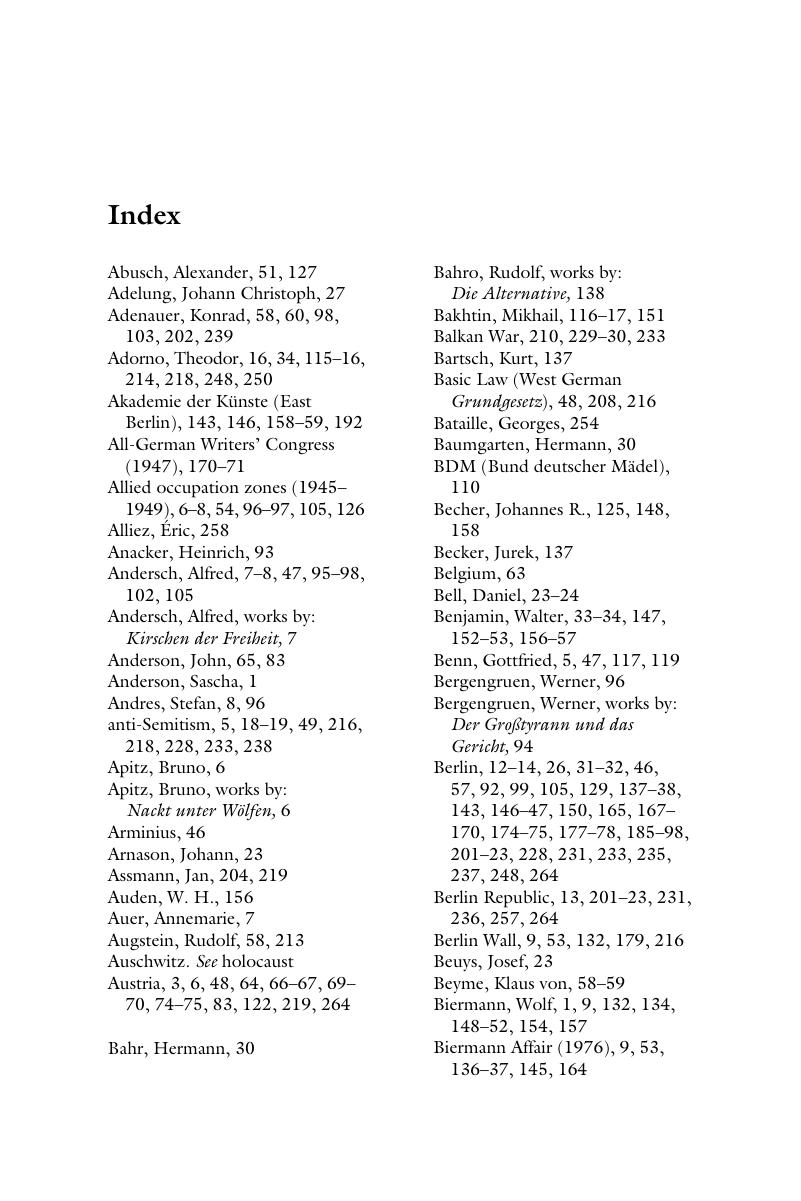Book contents
- Frontmatter
- Contents
- Introduction
- From Nature to Modernism: The Concept and Discourse of Culture in Its Development from the Nineteenth into the Twentieth Century
- The German “Geist und Macht” Dichotomy: Just a Game of Red Indians?
- “In the Exile of Internment” or “Von Versuchen, aus einer Not eine Tugend zu machen”: German-Speaking Women Interned by the British during the Second World War
- “Deutschland lebt an der Nahtstelle, an der Bruchstelle”: Literature and Politics in Germany 1933–1950
- “Das habe ich getan, sagt mein Gedächtnis. Das kann ich nicht getan haben, sagt mein Stolz! …” History and Morality in Hochhuth's Effis Nacht
- Stefan Heym and GDR Cultural Politics
- Reviving the Dead: Montage and Temporal Dislocation in Karls Enkel's Liedertheater
- Living Without Utopia: Four Women Writers' Responses to the Demise of the GDR
- A Worm's Eye View and a Bird's Eye View: Culture and Politics in Berlin since 1989
- Remembering for the Future, Engaging with the Present: National Memory Management and the Dialectic of Normality in the “Berlin Republic”
- “Wie kannst du mich lieben?”: “Normalizing” the Relationship between Germans and Jews in the 1990s Films Aimée und Jaguar and Meschugge
- Models of the Intellectual in Contemporary France and Germany: Silence and Communication
- Notes on the Contributors
- Index
Index
Published online by Cambridge University Press: 05 February 2013
- Frontmatter
- Contents
- Introduction
- From Nature to Modernism: The Concept and Discourse of Culture in Its Development from the Nineteenth into the Twentieth Century
- The German “Geist und Macht” Dichotomy: Just a Game of Red Indians?
- “In the Exile of Internment” or “Von Versuchen, aus einer Not eine Tugend zu machen”: German-Speaking Women Interned by the British during the Second World War
- “Deutschland lebt an der Nahtstelle, an der Bruchstelle”: Literature and Politics in Germany 1933–1950
- “Das habe ich getan, sagt mein Gedächtnis. Das kann ich nicht getan haben, sagt mein Stolz! …” History and Morality in Hochhuth's Effis Nacht
- Stefan Heym and GDR Cultural Politics
- Reviving the Dead: Montage and Temporal Dislocation in Karls Enkel's Liedertheater
- Living Without Utopia: Four Women Writers' Responses to the Demise of the GDR
- A Worm's Eye View and a Bird's Eye View: Culture and Politics in Berlin since 1989
- Remembering for the Future, Engaging with the Present: National Memory Management and the Dialectic of Normality in the “Berlin Republic”
- “Wie kannst du mich lieben?”: “Normalizing” the Relationship between Germans and Jews in the 1990s Films Aimée und Jaguar and Meschugge
- Models of the Intellectual in Contemporary France and Germany: Silence and Communication
- Notes on the Contributors
- Index
Summary

- Type
- Chapter
- Information
- Politics and Culture in Twentieth-Century Germany , pp. 265 - 274Publisher: Boydell & BrewerPrint publication year: 2003

